A Guide to Dentures, Implants, and Implant-Supported Dentures

Find the perfect replacement for your missing teeth.
Coping with tooth loss is a struggle millions of Americans experience. Not only can the loss of a tooth impact your smile’s appearance and your own self-confidence, but the loss of multiple or all your teeth can negatively affect your oral and general health. The good news is modern dentistry offers a choice of restoration services that can help patients regain a full, healthy smile. Two very popular prosthetic options include dentures and dental implants.
To help you decide the best tooth replacement for your smile, here is a handy guide on the different varieties of dentures and dental implants.
Traditional Dentures
Dentures are what come to mind when most people think about replacing full arches of missing teeth. These familiar prosthetics are widely available, and modern designs are quite natural and comfortable.
Dentures are removable prosthetic devices that mimic teeth and gums.
Dentures replace full arches of teeth with a prosthetic piece complete with teeth and gums. A variety of materials are used to create dentures, including porcelain, acrylic resin, metal, and nylon.
Dentures rely on soft and hard tissue in the mouth for support.
Denture prosthetics sit directly on the gum, using the soft gum tissue and the harder tissue beneath as a support. Dentures need special adhesives and creams to remain in place and stable.
Partial dentures are an option for replacing multiple missing teeth.
Partial dentures replace one or more missing teeth in patients who still have remaining teeth. This option allows you to use dentures while still having natural teeth in your smile.
Dentures are a low-tech, economical option that do require repairs.
Dentures may be considered low-tech, though advances in design have come a very long way. They are non-invasive to place and generally are an economical choice if you’re on a budget. However, dentures do need repairs, refittings, and occasional replacement, which adds to their long-term expense.
Dentures don’t have the strength or stability of natural teeth.
Dentures don’t feel the same as natural teeth. You might feel aware that you’re “wearing” something in your mouth rather than it feeling like a natural part of your mouth. You may also need to change your diet as dentures don’t have the stability and bite force of natural teeth.
Dentures don’t preserve jaw and facial bone health.
Denture-wearers will see that their jawbone and facial appearance do change the longer they have their dentures. This is because the bones in the jaw naturally shrink away if a tooth root isn’t present to stimulate that bone. Dentures aren’t able to prevent this from happening.
Dental Implants
Dental implants are a state-of-the-art prosthetic tooth replacement with superior benefits for patients. While they aren’t the right choice for everyone, they are certainly worth considering if you are a candidate.
Dental implants are a high-tech, three-piece prosthetic tooth replacement.
Conventional dental implants are made of three components—the implant post, the abutment, and the prosthesis. The implant post is made of high-grade titanium, the abutment serves as a foundation for the prosthesis, and the prosthesis is generally a dental crown for an individual tooth.
Dental implants rely on your jawbone for support.
The dental implant post is inserted directly into your jawbone, mimicking the root of a natural tooth. This provides the most stable, natural support possible for any prosthetic tooth replacement. This does mean, however, that in order to be a candidate for an implant you must have a healthy amount of bone to anchor the post or be willing to undergo a bone graft.
Dental implants preserve jaw and facial health.
Because dental implant posts are placed in the jawbone, they preserve healthy bone structure in the jaw and face. Dental implants wearers won’t experience bone shrinkage or premature facial aging or sagging.
Dental implant surgery is invasive and requires months of healing.
Dental implants require surgery to place the implant post. It takes months for the jawbone to fuse fully to the titanium post. The invasiveness and longer healing period is considered one of the very few downsides of dental implants and may limit candidacy for people with specific medical conditions.
Dental implants feel and function like natural teeth.
After the initial healing period, you’ll quickly grow accustomed to your dental implants. They function and feel extremely natural. Best of all, they have nearly the same bite force as natural teeth, meaning you won’t have to change your diet.
Dental implants require no specialized care or use of adhesives.
Since dental implants are permanently fixed in your jaw, there is no need for any sort of adhesives. You simply take care of them with normal brushing and flossing like natural teeth.
Successful dental implants last for life.
Dental implants are expensive compared to other restorative dental care, but they are a fantastic investment because they last for life. Dental implants have a success rate of 90% to 95% and a healthy implant will never need to be replaced. The prosthesis (dental crown) may need to be replaced, but they last 15 years or more with proper oral hygiene.
Implant-Supported Dentures
When both dentures and dental implants seem like viable options, implant-supported dentures may be the perfect middle ground.
Implant-supported dentures combine the best of both worlds.
Implant-supported dentures combine a denture prosthetic with implant posts, with the denture sitting on top of multiple implant posts. Implant-supported dentures give the longevity, stability, and comfort of dental implants with the economic benefit dentures have of replacing multiple missing teeth.
Implant-supported dentures rely on your jawbone for support.
Implant-supported dentures rely on the implant post surgically placed in your jaw for support. This gives you the same advantage of preserving bone health as you get with conventional dental implants.
Implant-supported dentures eliminate the need for individual posts.
Conventional dental implants replace missing teeth individually, meaning one post per missing tooth. The technology of implant-supported dentures allows the dentist to replace entire arches of teeth with as few as four to eight dental implants. This is far less invasive for the patient and much more economical.
Implant-supported dentures can be fixed or removable.
Another technological advantage of implant-supported dentures is the ability to choose between a fixed denture or a removable one. A fixed denture is designed to always be in place unless removed by your dentist. A removable denture can be popped out of place to make cleaning easier.
Learn more about dentures, dental implants, and implant-supported dentures with a consultation at Berrien Dental.
Whether dentures seem like the right choice or dental implants have caught your eye, the dentists at Berrien Dental will guide you to the right choice.
If you’re interested in restoring your smile after tooth loss, we recommend starting with a consultation to learn about your options and discover whether you are a candidate for your preferred treatment. You can schedule your consultation at our Berrien Springs or St. Joseph locations by calling the office directly or using this online form.
